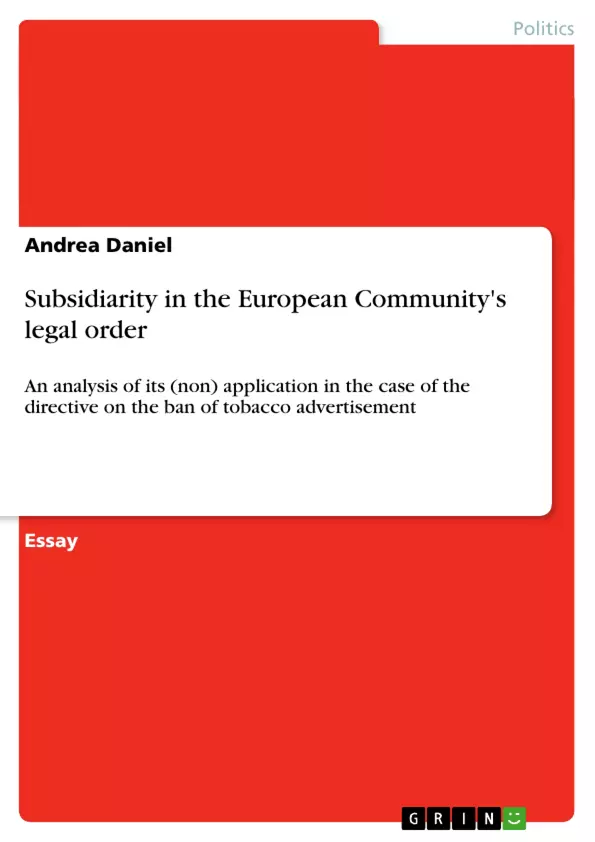The subject of this essay is the implementation of the subsidiarity-principle in the EC's legal order. While EC-laws have supremacy over national laws and become a part of the national legal order, self-standing national laws are applicable where the EC has no legislative competence. In this aspect, the EC’s system is comparable to e.g. the German federal system. The essay shows that the EC’s legislative system balances the powers of the supranational and the national level by certain legal instruments: The principle of “limited empowerment”, the distinction between exclusive and competitive competences and the necessity of a “legal basis” for every supranational legislative act. As their justiciability is essential for the lower levels’ protection from power centralisation the Member States can litigate at the European Court of Justice against “lack of competence” when the EC meddles in affairs for which it is not empowered. The theoretical implementation as well as the – sometimes unsatisfying – practical application of these instruments is illustrated on the examples of two EC-directives on the ban of tobacco advertisements and the German litigation against them for “lack of competence”.
Inhaltsverzeichnis (Table of Contents)
- Introduction
- The subject
- Methodology
- Subsidiarity - how to put a principle into legislative practice
- The German Model
- Subsidiarity in the semi-federal system of the European Community
- A fight for subsidiarity - the challenge of the ban on tobacco advertisement's legal basis
- The first directive
- The Second Directive
- What about subsidiarity now?
Zielsetzung und Themenschwerpunkte (Objectives and Key Themes)
This essay examines the implementation of the subsidiarity principle in the European Communities' (EC) legal order. It analyzes the interplay between EC laws and national laws, particularly in the context of the EC's limited empowerment, the distinction between exclusive and competitive competences, and the requirement of a legal basis for all supranational legislative acts. The essay explores the mechanisms by which member states (MS) can litigate against potential overreach by the EC, highlighting the importance of these mechanisms for preventing power centralization. The theoretical implementation of these instruments is further illustrated through case studies of two EC directives on the ban of tobacco advertisements and the subsequent German litigation against them.
- Subsidiarity in the European Communities' legal order
- Balancing supranational and national powers
- Legal instruments for implementing subsidiarity: limited empowerment, exclusive and competitive competences, legal basis
- Justiciability of EC legislative acts
- Case studies of tobacco advertisement bans and German litigation
Zusammenfassung der Kapitel (Chapter Summaries)
The introduction lays out the subject of the essay, focusing on the implementation of the subsidiarity principle in the European Communities' legal order. It highlights the balance between supranational and national powers, emphasizing the crucial role of legal instruments in achieving this balance. The essay's methodology is also introduced, outlining the definition of subsidiarity and its application in a federal state context.
The second chapter delves into the practical implementation of the subsidiarity principle, examining the German model as an example. It explores the allocation of responsibilities between different levels of government in Germany, emphasizing the limits on federal competence and the role of legal basis requirements. The chapter also explores the justiciability of legislative acts, highlighting the ability of Länder to appeal to the Constitutional Court.
The third chapter examines the application of the subsidiarity principle in the semi-federal system of the European Community. It traces the evolution of the EC's responsibilities, emphasizing the increasing need for a clearer relationship between sovereign member states and the supranational legal order. The chapter highlights the development of the concept of a restricted supranational EC, as well as the potential for challenges to this framework, exemplified by the Factortame case. The introduction of subsidiarity into the EC's legislative procedure via the Maastricht Treaty is also discussed.
Schlüsselwörter (Keywords)
The key topics and concepts explored in this text include the subsidiarity principle, European Communities' legal order, supranational and national powers, limited empowerment, exclusive and competitive competences, legal basis requirement, justiciability of legislative acts, German federal system, and the Factortame case.
Frequently Asked Questions
What is the subsidiarity principle in the EC legal order?
It is a principle that governs the exercise of power, ensuring that the European Community only acts if objectives cannot be sufficiently achieved by Member States at a national or local level.
What are "exclusive" vs. "competitive" competences?
Exclusive competences belong solely to the EC, while competitive (concurrent) competences allow both the EC and Member States to legislate, subject to subsidiarity rules.
How can Member States protect themselves from power centralization?
Member States can litigate at the European Court of Justice (ECJ) against acts they believe lack a proper legal basis or violate the principle of limited empowerment.
What role did the German federal system play in this analysis?
The German federal model serves as a comparison for how responsibilities are allocated between different levels of government and how legal bases limit federal power.
What was the significance of the tobacco advertisement ban case?
It serves as a practical example of German litigation against EC directives for "lack of competence," illustrating the tension between supranational legislation and national sovereignty.
When was subsidiarity formally introduced into EC procedure?
The principle was formally introduced into the legislative procedure through the Maastricht Treaty.
- Arbeit zitieren
- Andrea Daniel (Autor:in), 2009, Subsidiarity in the European Community's legal order, München, GRIN Verlag, https://www.grin.com/document/131594



